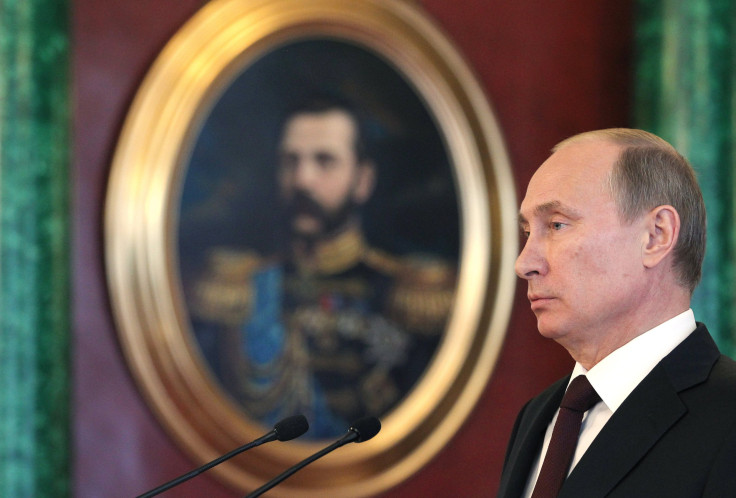Shades Of Crises Past As Russia Raises Rates Amid Falling Ruble And Capital Flight

Oligarchs in Vladimir Putin’s inner circle mocked U.S. sanctions imposed after Russia annexed Crimea last month, but they are discovering it’s harder to laugh off international markets.
Average yields on Russian corporate debt rose to a one-month high of 6.85 percent, according to a Bloomberg report that cited Bank of America Merrill Lynch’s Russia & Former Soviet States Emerging Markets index.
Bloomberg said Russian government debt maturing in 2027 saw its yield jump to 9.6 percent on Friday, marking a weekly gain in the rate of 0.6 percent. Stocks in Russia fell 1.6 percent on Friday.
“Russian asset prices have taken a hit,” Merrill analysts told clients in a Friday note. “Growth expectations have declined for this year and next,” he said, adding “with the consensus souring on Russia.”
Standard and Poor’s on Friday lowered Russia's currency and sovereign debt ratings and hinted at the possibility of another sovereign debt rating downgrade if Moscow's economy slows further and its confrontation with the West heats up. There’s a good chance of both happening.
"If we perceived increased risks to Russia's creditworthiness stemming from much weaker medium-term economic growth or due to reduced monetary policy flexibility, we could lower our sovereign ratings on Russia further," the big U.S. ratings agency said in a statement.
Those comments echo U.S. Secretary of State John Kerry’s words overnight, cautioning that Russia was making an “expensive mistake” carrying forward its policy.
“The Russian economy was already weakening before the Ukraine crisis and it will not be able to withstand trade sanctions. Russia is still, in essence, an exporter of commodities and arms, in return for which it buys western manufactured goods,” Tom Elliott, international investment strategist at deVere Group said on Friday.
The nation's current financial difficulties are not unfamiliar.
In August 1998, Moody’s downgraded Russia when the country was burdened with a high Chechnyan war debt, soaring interest rates and falling commodity prices. While Russia has probably not spent much yet on its Crimea adventure, those costs will rise if the crisis escalates.
Moscow’s interest rate hike on Friday left short-term rates at a relatively modest 7.5 percent, but Putin’s cadre of business advisors and rumored financial patrons so recently boasting of Fortress Russia surely recall the 47 percent yields their government’s paper sported in 1998.
Russia is particularly sensitive to commodity prices. Crude oil prices have fallen about 3 percent this week alone. Longer term, analysts expect new technology to drive increasing production in the west at the same time efficiency is rising. Add China’s cooling economy to the mix and the short-term economic outlook may spell trouble for Putin.
Since the invasion, Russia’s access to western hard currency has been tightened and that’s made it harder to borrow money internationally, raised inflation at home and knocked its currency lower on international markets.
Together those add up to slower growth that S&P cautioned could trigger another downgrade.
And while the oligarchs said one thing -- crowing publicly how safe their money was in Russia -- they and others with assets in Russia were sending tens of billions of dollars abroad. In early April Russia’s central bank data showed a net capital outflow of $63.7 billion in the first quarter. That was more than the $63 billion that left the country in all of 2013.
Earlier this week a spokesman for Russia’s Finance Ministry said it expected 2014 total outflow to reach about $70 billion to $80 billion, a figure that seems low to many, including the country’s economic ministry.
© Copyright IBTimes 2025. All rights reserved.






















